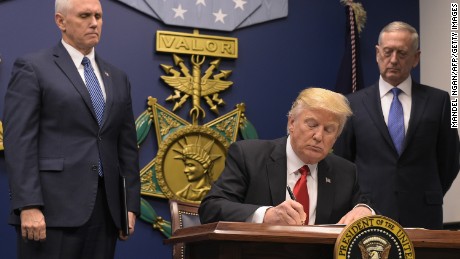Through an executive order entitled, "Protecting the Nation From Foreign Terrorist Entry Into the United States," President Donald Trump instructed immigration authorities to devise ways to conduct more thorough investigations into the background of potential visitors, refugees and immigrants to the United States. The measures are aimed at an attempt to prevent aliens with terrorist ties from gaining admission to the United States. While the additional measures are being created, the President also temporarily suspended certain immigration benefits.
President Trump instructs the Secretary of Homeland Security, in consultation with the Secretary of State and the Director of National Intelligence, to determine what information is needed to determine whether a person who has applied for an immigration benefit poses a threat to national security. The Secretary of Homeland Security is then to submit a report within thirty days on the information needed, and on which countries do not supply this information. The Secretary of State is then to request that the countries listed start supplying the information identified by Homeland Security. Sixty days later, the Secretary of Homeland Security is to submit a list of countries recommended to be included in a list from which the President will prohibit entry into the United States.
To alleviate the burden on the investigating agencies, entries of all aliens from countries that have been determined to be state sponsors of terrorism by the Department of State are being suspended during this ninety day period. During the ninety day period, the Secretaries of State and Homeland Security may determine on a case-by-case basis if certain individuals should be permitted entry, notwithstanding the suspension.
Immigration authorities are also instructed to establish a program to identify aliens seeking to entry the United States through fraud, and who have an intention to cause harm or are at risk to cause harm after their admission. This program is to include a database of identity documents to prevent such fraud.
Finally, the Secretary of State, in conjunction with the Secretary of Homeland Security and in consultation with the Director of National Intelligence, and is to review procedures to approve refugee applications to determine what additional measures should be taken to prevent the admission of aliens who pose a threat to U.S. security. For 120 days, the entire refugee program is suspended. After the instructed review is complete, the Secretary of State, the Secretary of Homeland Security and the Director of National Intelligence will then provide a list of countries for which the addition measures are adequate to protect U.S. security. Only refugees from these countries will be permitted to enter the United States.
The suspension of immigration benefits is temporary in nature. The suspension is intended to permit U.S. authorities to review security measures, and recommend additional security measures. Contrary to popular media, the measures are not aimed specifically at Muslim countries. The measures are aimed at countries that have been determined to be state sponsors of terrorism. Far from discriminating on religious bases, the President actually condemns all of "those who engage in acts of bigotry or hatred (including 'honor' killings, other forms of violence against women, or the persecution of those who practice religions different from their own) or those who would oppress Americans of any race, gender, or sexual orientation."
By: William J. Kovatch, Jr.
For an appointment, call (703) 837-8832
(571) 551-6069 (ESP)


